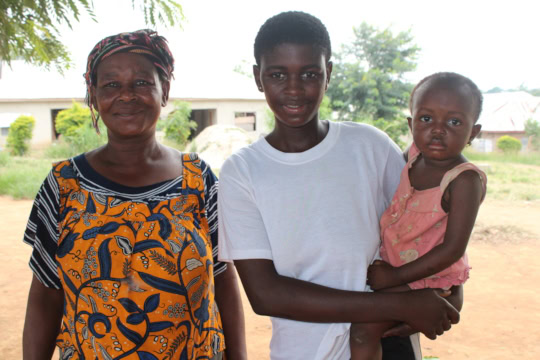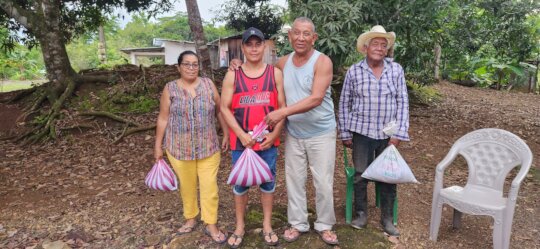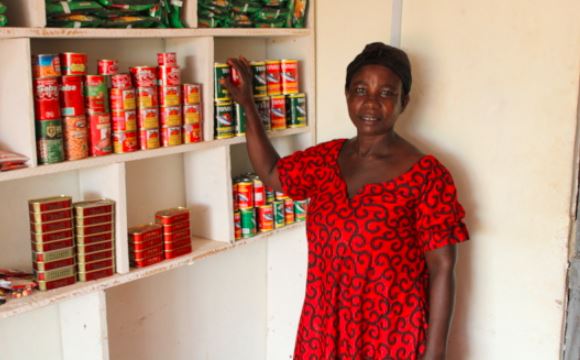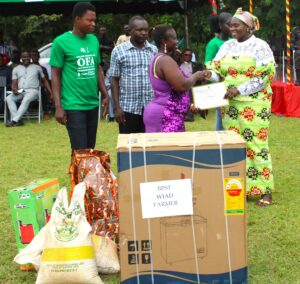Solomon Puts Agriculture Waste to Productive Use
 In Atwima Nwabiagya, many farmers engage in rice farming for both personal consumption and as a cash crop. After harvesting the rice, much of the rice straw remaining is considered waste. Some farmers throw away the rice straw away, while others burn it leading to environmental pollution. Many farmers continue this practice just as farmers before them did, unaware of the environmental impact.
In Atwima Nwabiagya, many farmers engage in rice farming for both personal consumption and as a cash crop. After harvesting the rice, much of the rice straw remaining is considered waste. Some farmers throw away the rice straw away, while others burn it leading to environmental pollution. Many farmers continue this practice just as farmers before them did, unaware of the environmental impact.
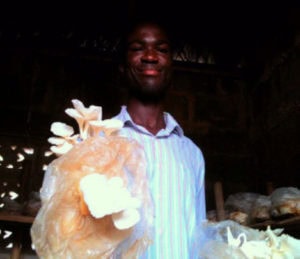 Solomon is a thirty-three year old graduate from the University of Education, Winneba Campus where he earned a Bachelor’s degree in Education. He and his wife, Abigail, have one son, and cultivate a rice farm in Atwima Nwabiagya.
Solomon is a thirty-three year old graduate from the University of Education, Winneba Campus where he earned a Bachelor’s degree in Education. He and his wife, Abigail, have one son, and cultivate a rice farm in Atwima Nwabiagya.
Solomon completed a training course at the Fran Mueller & Virginia Lageschulte Young Adult Training Center in Feburary 2015, where he learned about mushroom production. Just like the other graduates, he learned how to compost using sawdust, another common “waste” product from the mills. However, sawdust has not been as readily available lately due to rolling power outages in Ghana which have lead to lumber mills producing only a fraction of the outputs, and therefore a fraction the sawdust.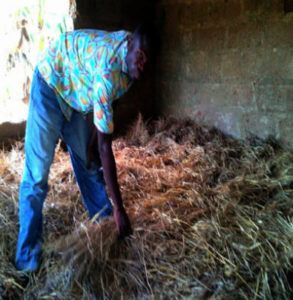
Solomon decided to diversify his business pursuits by adding in mushroom production. In order to maximize returns on his investment, he explored an innovative idea: to tap into this wasteful material he had ready access to on his farm, and turn the rice straw “waste” into compost for his mushroom. In March, Solomon started a pilot study by collecting most of the straw produced nearby test out his theory that rice straw could be used in place of sawdust for compost for mushroom production. Despite the rice straw substitution, the mushrooms grew and he was able to successfully start up a new enterprise. In fact, the yields of oyster mushrooms were higher than those produced using sawdust compost. The straw produces mushrooms much bigger in sizes than the sawdust. Consumers appear to prefer the larger mushrooms to smaller ones.
Mushroom production is now a family business. The enterprise supports the livelihoods of both Solomon and his wife, Abigail, who was previously unemployed, but is now the sales person for their home business. This innovative trial was observed by a Self-Help internship student, who plans to re-create the trial for her final year capstone project. The results will be shared with all future trainees so they are able to make the most informed decision about how to re-purpose readily available materials in their mushroom production pursuits.
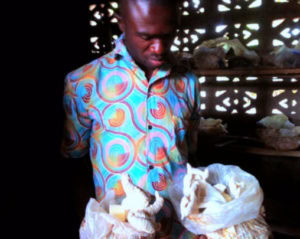 Thank you for your support of Self-Help’s Young Adult Training Center in its mission to alleviate youth un(der)employment in Ghana. Your support empowers Solomon and other young adults like him with the training and start-up capital they need to start new ventures and better provide for their families.
Thank you for your support of Self-Help’s Young Adult Training Center in its mission to alleviate youth un(der)employment in Ghana. Your support empowers Solomon and other young adults like him with the training and start-up capital they need to start new ventures and better provide for their families.

 Next Post
Next Post